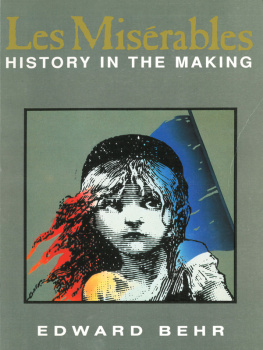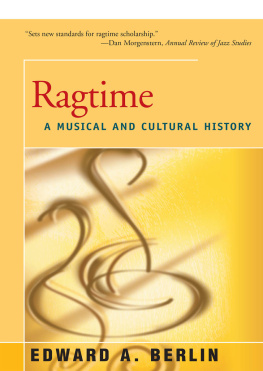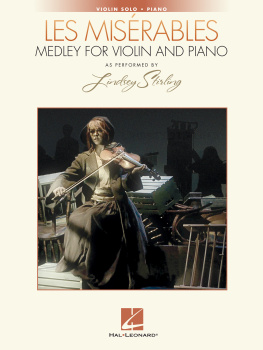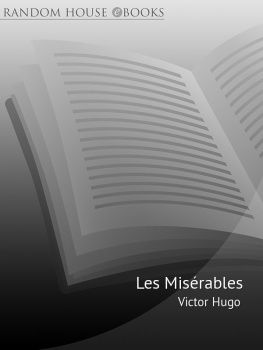Edward Behr - Les Misérables: History in the Making
Here you can read online Edward Behr - Les Misérables: History in the Making full text of the book (entire story) in english for free. Download pdf and epub, get meaning, cover and reviews about this ebook. year: 2013, publisher: Skyhorse Publishing, genre: Non-fiction. Description of the work, (preface) as well as reviews are available. Best literature library LitArk.com created for fans of good reading and offers a wide selection of genres:
Romance novel
Science fiction
Adventure
Detective
Science
History
Home and family
Prose
Art
Politics
Computer
Non-fiction
Religion
Business
Children
Humor
Choose a favorite category and find really read worthwhile books. Enjoy immersion in the world of imagination, feel the emotions of the characters or learn something new for yourself, make an fascinating discovery.
- Book:Les Misérables: History in the Making
- Author:
- Publisher:Skyhorse Publishing
- Genre:
- Year:2013
- Rating:5 / 5
- Favourites:Add to favourites
- Your mark:
- 100
- 1
- 2
- 3
- 4
- 5
Les Misérables: History in the Making: summary, description and annotation
We offer to read an annotation, description, summary or preface (depends on what the author of the book "Les Misérables: History in the Making" wrote himself). If you haven't found the necessary information about the book — write in the comments, we will try to find it.
A history of the musical version of this classic novel.
Edward Behr: author's other books
Who wrote Les Misérables: History in the Making? Find out the surname, the name of the author of the book and a list of all author's works by series.
Les Misérables: History in the Making — read online for free the complete book (whole text) full work
Below is the text of the book, divided by pages. System saving the place of the last page read, allows you to conveniently read the book "Les Misérables: History in the Making" online for free, without having to search again every time where you left off. Put a bookmark, and you can go to the page where you finished reading at any time.
Font size:
Interval:
Bookmark:
Edward Behr

Arcade Publishing New York
By the same author
THE ALGERIAN PROBLEM
ANYONE HERE BEEN RAPED AND SPEAKS ENGLISH?
GETTING EVEN
THE LAST EMPEROR
HIROHITO: BEHIND THE MYTH
Copyright 1989, 1996, 2012 by Edward Behr
All Rights Reserved. No part of this book may be reproduced in any manner without the express written consent of the publisher, except in the case of brief excerpts in critical reviews or articles. All inquiries should be addressed to Arcade Publishing, 307 West 36th Street, 11th Floor, New York, NY 10018.
Arcade Publishing books may be purchased in bulk at special discounts for sales promotion, corporate gifts, fund-raising, or educational purposes. Special editions can also be created to specifications. For details, contact the Special Sales Department, Arcade Publishing, 307 West 36th Street, 11th Floor, New York, NY 10018 or
Arcade Publishing is a registered trademark of Skyhorse Publishing, Inc., a Delaware corporation.
Previously published under the title The Complete Book of Les Misrables, this book has been updated for the paperback edition.
The following copyrighted material is used
by permission:
English lyrics 1985 Alain Boublil Music Ltd.
All dramatic performance rights worldwide in the musical Les Misrables reserved to
Cameron Mackintosh (Overseas) Ltd., of 1 Bedford Square, London WC1B 3RA.
Les Misrables logo 1986 Cameron Mackintosh (Overseas) Ltd.
Les Misrables graphics designed by Dewynters PLC, London.
You and Ten Little Bullets 1984 James Fenton
Copvright for the photographs in this book is held by Michael
Le Poer Trench unless otherwise specified in the Picture Credits.
Visit our website at www.arcadepub.com.
10 9 8 7 6 5 4 3 2 1
Library of Congress Cataloging-in-Publication Data is available on file.
ISBN: 978-1-61145-753-7
eISBN: 978-1-61321-314-8
I would like to thank all those who talked to me at great (and sometimes repeated) length, answered all questions patiently and frankly and without whom this book would not have been possible: Alain Boublil, John Caird, James Fenton, Dudu Fisher, Freddy Gershon, David Hersey, Richard Jay-Alexander, Herbert Kretzmer, Patti LuPone, Gillian Lynne, Cameron Mackintosh, Patricia Macnaughton, John Napier, Andreane Neofitou, Trevor Nunn, Claude-Michel Schnberg, Julian Slade, Colm Wilkinson and many, many others.
Thanks also to James Fenton for allowing me to reproduce the lyrics of You and Ten Little Bullets and - last but not least - to Victor Hugo himself, to whom all those involved in the Les Misrables musical-theatre undertaking owe a huge, unrepayable debt.
The photographs between pages 108 and 139 were taken by Michael Le Poer Trench at various productions of Les Misrables around the world.
One Day More, original London cast; beginning of Act Two, Vienna; On My Own, Los Angeles; the barricade, Toronto; Shoot me now or shoot me later, Third National Company, USA; Little people know, Australia; Give me the spy, Javert, London; A Little Fall of Rain, original London cast; Bring Him Home, original London cast; Enjolras, Broadway; Enjolras after the death of Gavroche, Vienna; So youd better run for cover, Broadway; death on the barricade, Broadway; death of Enjolras, First National Company, USA; the Paris sewers, Toronto; Dog Eat Dog, Norway; Javert and Valjean - the final confrontation, Los Angeles; There is no way to go on ..., London; Ring out the bells, Vienna; the wedding ball, Boston; My last confession, Australia; Msieur,lay down your burden, Vienna; To love another person is to see the face of God, London, 1985; grand finale, Japan.
The author and publishers are grateful to the following for permission to reproduce additional material: Newsweek, p.6; Canyon Records, p. 155 top; David Crosswaite, p. 140; Festival Records Pty, p. 157; Hulton-Deutsch, pp.15, 19, 21 top & bottom, 22, 23, 24, 25, 27, 30 top & bottom, 32, 36, 39, 146; Poltydor/Deutschesgrammaphon, p. 154 bottom; Toho Co. Ltd, Japan, pp. 138-9, 144, 145; Collection Vidlet, p. 42; Washington Post, p. 158.
by Cameron Mackintosh
Until I heard the original French album of Les Misrables in 1982 I had always considered the idea of a French musical a contradiction in terms. The French have hardly ever taken to modern musicals, and Paris has proved the early graveyard for most of the worldwide musical successes of the last fifty years; they prefer revivals of operettas, Euro-rock musicals of dubious origin and the occasional short, chic season of American touring musicals - performed in English. How two Frenchmen, Claude-Michel Schnberg and Alain Boublil, managed not only to survive in such an alien culture but also write one of the greatest musicals of all time is a miracle.
The moment I listened to that original recording by Schnberg and Boublil (those two names were completely unknown to me) I knew I wanted to produce Les Misrables on the London stage. How this came about, and what happened subsequently, is told in this special edition of Edward Behrs book, published to coincide with the tenth anniversary of the opening of Les Misrables.
Since its original premiere, on 8 October 1985, Les Misrables has gone on to enjoy a success that defies national boundaries and has become the worlds most popular musical. It has been translated into fifteen languages and played in twenty-three countries. Some of its songs have taken on a symbolic meaning that could not possibly have been foreseen. In the closing stages of the last Presidential campaign, One Day More became Bill Clintons theme song.
Les Misrables has had a lasting effect on millions of spectators, and I can say the same. Not only did it transform my professional life, but it also showed the extraordinary ability of the public to recognise an original work, despite the fact that many of the critics originally dismissed or vilified the show.
Whatever their age, audiences all seem to appreciate Les Misrables sweeping emotions, its powerful depiction of the human character and, above all, its uplifting example of mans ability to triumph over adversity. Hugos novel is undoubtedly the strongest source material that any musical has been blessed with, and in Alain and Claude-Michels creation, aided by Herbert Kretzmers powerful English lyrics, we have that rare occurrence of the masterpiece in one medium becoming the masterpiece in another - a timeless novel has become a timeless musical.
Perhaps the best explanation for the enormous success of Les Misrables comes from Victor Hugo himself, when he wrote to his publisher: You are right, Sir, when you say Les Misrables is written for a universal audience. I do not know whether it will be read by everyone but it is meant for everyone.
and Times of Victor Hugo
1772 Birth of Sophie-Fran^oise Trbuchet, Victor Hugos mother.
1773 Birth of Lopold-Sigisbert Hugo, Victor Hugos father.
1789 French Revolution begins.
1792 First French Republic proclaimed.
1792-95 The republican Convention, ending in Robespierres terror.
1793 Louis XVI executed. The Chouans (royalist Breton insurgents) begin their full-scale civil war against the republican French Government. Lopold-Sigisbert Hugo, an officer in the republican army, is posted to Brittany as part of the repressive peace-keeping force.
Font size:
Interval:
Bookmark:
Similar books «Les Misérables: History in the Making»
Look at similar books to Les Misérables: History in the Making. We have selected literature similar in name and meaning in the hope of providing readers with more options to find new, interesting, not yet read works.
Discussion, reviews of the book Les Misérables: History in the Making and just readers' own opinions. Leave your comments, write what you think about the work, its meaning or the main characters. Specify what exactly you liked and what you didn't like, and why you think so.













